Summary | Excerpt | Reviews | Beyond the Book | Read-Alikes | Genres & Themes | Author Bio

Critics' Opinion:
Readers' Opinion:
First Published:
Oct 2012, 608 pages
Paperback:
Aug 2013, 640 pages
 Book Reviewed by:
Book Reviewed by:
Kim Kovacs
Buy This Book
This article relates to Iron Curtain
 Communism is an economic and philosophical theory that can be summed up by a phrase made popular by the "father of communism," Karl Marx: "From each, according to his ability, to each according to his need."
Communism is an economic and philosophical theory that can be summed up by a phrase made popular by the "father of communism," Karl Marx: "From each, according to his ability, to each according to his need."
In its ideal form, all property is held in common; there is no private ownership. There are also no class divisions, and equal weight is given to everyone in the society regardless of gender or race. Poverty and wealth are both non-existent since all products and services are distributed equally to all. Decisions are based on what will benefit society as a whole as opposed to what will enrich just one person or group.
Although communism became an important influence beginning in the middle of the 19th century, it is not a new theory. Marx believed that it was the natural state for primitive hunter-gatherer communities, and that private property didn't develop until people were well off enough to produce a surplus. The idea of a classless society goes back at least as far as Ancient Greece with the publication of Plato's The Republic around 380 BCE. Thomas More's Utopia (1516 CE) portrays a society based on common ownership of property. Various religious communities such as monasteries have also followed communist ideals throughout history, believing that scriptures endorse a communal lifestyle (for example, the Christian Bible's Acts 2:44 seems to indicate the Apostles lived this way – "All the believers were together and had everything in common."). Although there are problems in the model, Kibbutzim – collective farming communities - is still in operation in Israel today.
Modern communism arose as a reaction to the Industrial Revolution in the West, particularly in Great Britain. Industrialization widened the gap between the large (and poorly treated) working class and the increasingly wealthy factory owners. Karl Marx and Friedrich Engels were among those critical of the inequity, and in 1848 collaborated to publish a highly influential pamphlet called "The Communist Manifesto." Allaboutphilosophy.org says this about the manifesto: "In it they declare that many problems in society are due to the unequal distribution of wealth. To bring about happiness and prosperity for all, the distinctions between the rich and poor of society must be eliminated. And since the rich will never give up their goods or status voluntarily, a rebellion of the poor - the working class - is necessary."
Marx and Engels felt that these steps were necessary to bring about a communist society:
The works of Marx heavily influenced Vladimir Lenin, the founder of Russia's Bolshevik Party, eventually leading to the October Revolution in 1917 – the first time in history a communist political party seized state power.
Several countries did endure violent revolutions and a shift to communism during the 20th century as predicted by Marx. In addition to Russia, communist governments arose in Albania, Angola, Cambodia, and Yugoslavia among others. Today, there are only five countries in the world where a communist party either leads a ruling coalition or holds a monopoly on power - China, Cuba, Laos, North Korea and Vietnam. There are about a dozen additional countries where the communist party participates in the ruling coalition; and a number of others with one or more elected officials who are members of the communist party.
Picture from historyguide.org
Filed under Society and Politics
![]() This "beyond the book article" relates to Iron Curtain. It originally ran in January 2013 and has been updated for the
August 2013 paperback edition.
Go to magazine.
This "beyond the book article" relates to Iron Curtain. It originally ran in January 2013 and has been updated for the
August 2013 paperback edition.
Go to magazine.





The Funeral Cryer by Wenyan Lu
Debut novelist Wenyan Lu brings us this witty yet profound story about one woman's midlife reawakening in contemporary rural China.
Your guide toexceptional books
BookBrowse seeks out and recommends the best in contemporary fiction and nonfiction—books that not only engage and entertain but also deepen our understanding of ourselves and the world around us.